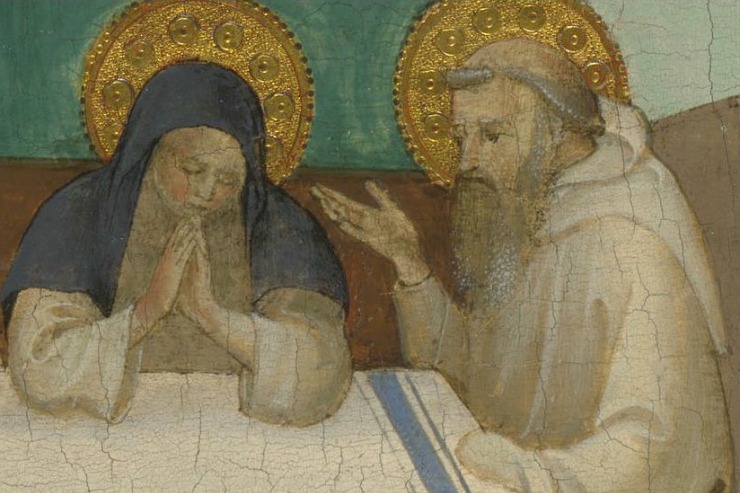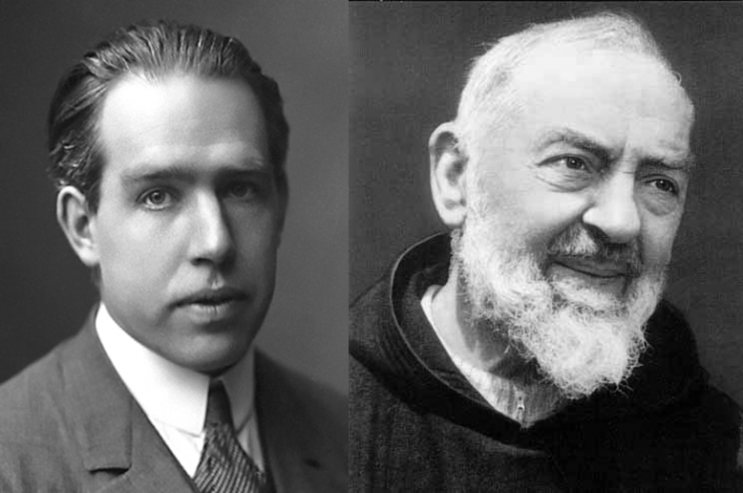If you have ever felt overshadowed by a sibling, you can find a patroness in the woman whose feast we celebrate on February 10, St. Scholastica. You might be a little more familiar with her twin brother, St. Benedict. The most famous story about St. Scholastica is found in the Dialogues of St. Gregory the Great, which contains a series of spiritual lessons derived from the life of St. Benedict, as told by his companions.
The siblings would meet once a year in a house near Benedict’s monastery. On this particular visit, like the ones before it, they fell into deep and holy conversation. As night approached, Benedict prepared to leave and return to his monastery. Scholastica begged him to stay, but the Benedictine Rule had strict rules for being outside the monastery after nightfall.
Gregory relates, “Their spiritual conversation went on and the hour grew late. The holy nun said to her brother: ‘Please do not leave me tonight; let us go on until morning talking about the delights of the spiritual life.’ ‘Sister,’ he replied, ‘what are you saying? I simply cannot stay outside my cell.’”
Scholastica turned to God for help, and before Benedict could leave, a violent thunderstorm erupted, making his departure impossible.
“When she heard her brother refuse her request, the holy woman joined her hands on the table, laid her head on them and began to pray. As she raised her head from the table, there were such brilliant flashes of lightning, such great peals of thunder and such a heavy downpour of rain that neither Benedict nor his brethren could stir across the threshold of the place where they had been seated. Sadly he began to complain: ‘May God forgive you, sister. What have you done?’ ‘Well,’ she answered, ‘I asked you and you would not listen; so I asked my God and he did listen. So now go off, if you can, leave me and return to your monastery.’ Reluctant as he was to stay of his own will, he remained against his will. So it came about that they stayed awake the whole night, engrossed in their conversation about the spiritual life.”
It was their last time together on this earth, as Scholastica died three days later. Benedict brought her body back to his monastery, and now the twins are buried in the same tomb at the monastery of Monte Cassino.
Perhaps this story is so dramatic, we are tempted to think we can learn nothing from it. On the contrary, this account should give us the boldness to ask the Father for gifts.
The prayer of Scholastica was bold. But she had the courage to ask for it because she knew she was asking out of love. Gregory tells us, “It is not surprising that she was more effective than he, since as John says, God is love, it was absolutely right that she could do more, as she loved more.”
That statement shocked me at first. Essentially, Gregory is telling us that Scholastica, at least at that moment, was holier than her brother. Her brother, St. Benedict, the father of Western Monasticism, the great spiritual father who gave the Church his deep and beautifully human Rule, did not love as much as Scholastica loved!
Ask our Father for gifts. Don’t be afraid. Ask boldly. Nothing is too small or too large to take your loving Father. Do we honestly believe God is Father? The great lie of the Devil is that God is a jealous God who wants us to be his slaves. That was the lie that Adam and Eve believed in the Garden, and that’s the lie that continually enslaves people every day after. Scripture is the beautiful love story of a God trying to show his people that he is a loving Father who would do anything for them.
“Or what man of you, if his son asks him for bread, will give him a stone? Or if he asks for a fish, will give him a serpent? If you then, who are evil, know how to give good gifts to your children, how much more will your Father who is in heaven give good things to those who ask him!” (Mt 7:9-11)
But do we honestly believe that? We are not worthy of his love, of course. We don’t deserve his gifts. And yet he continue to lavish them on us. Are we bold enough to ask for them?
In asking, of course, we have to be prepared for the answer. We have to be prepared that the answer might come in a different way than we expected or wanted. Several years ago I took an intention to God and tried to be open to His Will. I prayed a novena for a certain outcome, but ultimately admitted that I knew I had to pray for His Will to be done. If He had a different plan, He had a better plan, and I wanted that one instead. I didn’t necessarily feel that, but I knew intellectually I had to at least pray those words. When I received a big fat NO at the end of nine days, I was angry and hurt and confused. But then I had to go back to Him in thanksgiving. I did receive an answer. Just not the one I wanted. You know what? Seven years later, I couldn’t be more grateful for that no.
Be bold. Ask the Father for gifts. I’m not just speaking about large gifts, like conversions and healings and jobs and vocations. I’m talking about small gifts, too. One of my friends joined a convent several years ago. As a postulant, in her first year of formation, she admitted to me how much she missed hazelnut lattes. Yes, she missed a lot of other things, too – much bigger than hazelnut lattes. But those hazelnut lattes were a little something that she had enjoyed pre-convent and now were no longer accessible to her. A few days later, after she took it to God and offered that little sacrifice back to Him, there was a donation of hazelnut creamer to the novitiate.
She knew it was, in some small way, God smiling down at her. Perhaps it was not a miraculous thunderstorm that will make the history books, but she recognized the gift for what it was.
Don’t be afraid to ask God for gifts. Be bold. Ask out of love. And be open enough to recognize the gift when it comes- no matter how small, no matter how hidden.
“Ask, and it will be given you; seek, and you will find; knock, and it will be opened to you.” (Mt 7:7)
















